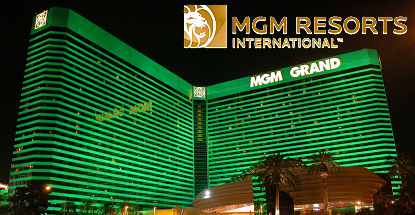 Casino operator MGM Resorts International believes its Q4 and FY 2014 results are further evidence that Vegas is back, baby. Chairman/CEO Jim Murren called Q4 earnings at MGM’s wholly owned US properties the best since their pre-recession peak while 2014 as a whole was its best in six years.
Casino operator MGM Resorts International believes its Q4 and FY 2014 results are further evidence that Vegas is back, baby. Chairman/CEO Jim Murren called Q4 earnings at MGM’s wholly owned US properties the best since their pre-recession peak while 2014 as a whole was its best in six years.
Despite the good news stateside, overall revenue fell 5.1% to $2.38b and MGM recorded a net loss of $342.3m, more than six times the loss in the same period a year earlier. The company blamed declines in Macau and a $263m income tax hit for the red ink. For 2014 as a whole, revenue was up 3% (+5% US, -1% in Macau) while earnings rose 5%.
Stateside, MGM’s US properties saw revenue rise 5% and operating income up 10%. The company credited the gains to improvements in table game turnover and win rate. Slots revenue rose 5% and room revenue rose 6% as occupancy increased three points to 88%. The MGM Grand Las Vegas was the star performer, with revenue up nearly 18% to $292m.
MGM’s partial ownership of the CityCenter in Vegas and the Borgata in Atlantic City had decidedly different fortunes, with the Borgata contributing $11.3m to MGM’s bottom line while CityCenter subtracted $18.1m.
Murren told analysts that he knew a “release valve” had been opened in Las Vegas when a party of 12 at the Bellagio’s Prime Steakhouse rang up a $300k dinner tab. Murren declined to make a trend out of one ridiculously extravagant dinner but called it “a sign people are ready to spend money again.” Murren declined to identify the big spenders but reports subsequently claimed Vice Media CEO Shane Smith had foot the bill following a lucky run at the blackjack tables.
Murren also referenced the possibility of boxers Floyd Mayweather Jr. and Manny Pacquiao finally squaring off in the ring, saying MGM was “holding the date on May 2 for a fight, and we hope it’s a big, big fight.” However, Murren cautioned that he was “just responding to newspaper rumors.”
MGM China Q4 revenue and earnings each fell 22% to $719m and $185m respectively, while operating income dropped by a third to $109m. Mass market table drop fell 4% but win rate gained five points, which pushed mass table revenue up 19%. It was a different (but all too familiar) story at the VIP tables, where turnover fell 32% and revenue fell 39%.
Macau’s VIP woes forced MGM to reallocate its gaming tables, to the point where over half its total tables are now allocated to the main gaming floor. Mass gaming accounted for 75% of MGM China’s Q4 profit, up from 60% in 2013.
Murren noted that with just one property in Macau, the US-focused MGM was “much less susceptible to market volatility” than some other operators. That said, the $2.9b MGM Cotai remains on track for a late-2016 opening, by which time maybe Macau will have shaken off its lethargy and resumed kicking stateside’s ass.
